-
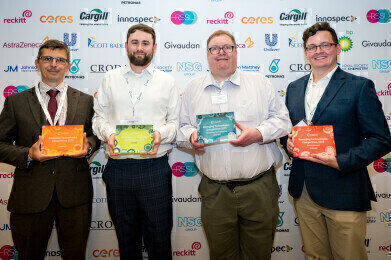 Left to right: Boris Breiner, Nick Furtak-Wells, Mike George, and Dean James, stand together with their 2023 Emerging Technologies Competition awards. (All pic credits: MP Photography)
Left to right: Boris Breiner, Nick Furtak-Wells, Mike George, and Dean James, stand together with their 2023 Emerging Technologies Competition awards. (All pic credits: MP Photography) -
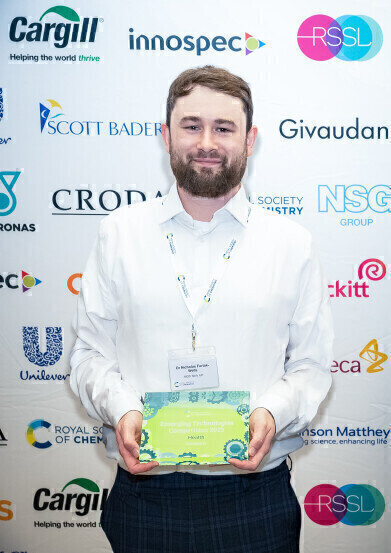 Nick Furtak-Wells, CEO of NIQS Tech, winner of the Health Award
Nick Furtak-Wells, CEO of NIQS Tech, winner of the Health Award -
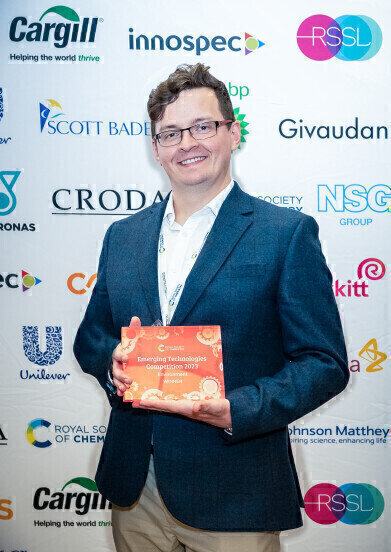 Dean James, CTO of Modelabs Ltd, winner of the Environment Award
Dean James, CTO of Modelabs Ltd, winner of the Environment Award -
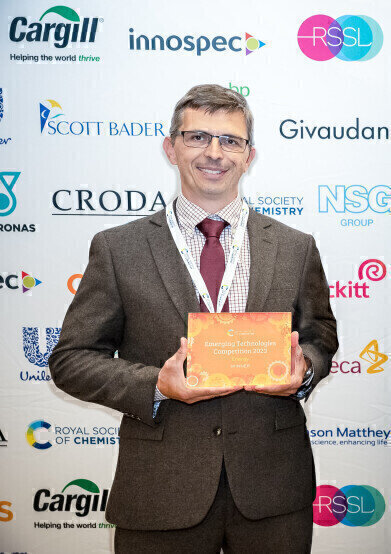 Boris Breiner, of Lambda Energy, winner of the Energy Award
Boris Breiner, of Lambda Energy, winner of the Energy Award -
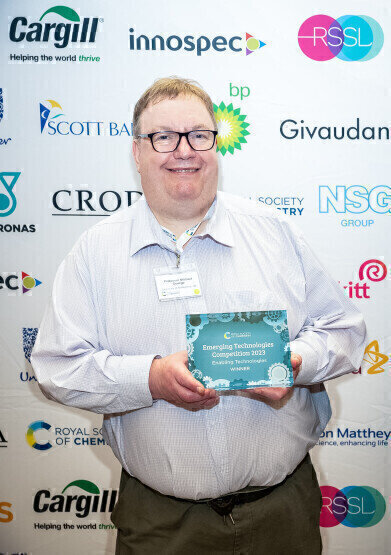 Mike George, of Nottingham Vortex, winner of the Enabling Technologies Award
Mike George, of Nottingham Vortex, winner of the Enabling Technologies Award
News
Chemistry-led Solutions to Global Challenges presented at RSC Competition
Aug 09 2023
The Royal Society of Chemistry has announced the winners of its 2023 Emerging Technologies Competition, which has been designed to celebrate and recognise the role of chemistry in solving problems across the world – and how crucial it is to creating companies that deliver sustained benefit to the economy. The selected finalists across four categories faced a panel of industry heavyweights, to convince them that their innovations could tackle today’s societal, environmental and economic challenges.
The winners, who also shared £100,000 of no strings funding to accelerate and grow their businesses were;
The University of Nottingham - Enabling Technologies category. The University of Nottingham wowed judges with its scalable platform for improved manufacturing processes in pharmaceuticals, agrochemicals and fine chemicals. The technology - a continuous-flow Vortex Reactor - uses continuous photo-, electro-, and thermo-chemistry to minimise the chemicals, solvents and processing steps needed to construct complex molecules.
Lambda Energy - Energy category. A technology that could reduce the carbon footprint of agriculture and improve food security impressed judges in the energy category. The light changing materials technology, presented by Lambda Energy, could boost farmers’ production by 20%. It works by using Passive Light Management for Greenhouse Horticulture greenhouse coatings to increase the amount of red light available to plants, increasing crop yield, all without the need for electricity.
Mode Labs Ltd. - Environment category. A new method for monitoring water pollution was also recognised by judges. Using optical microcavity technology, Mode Labs Ltd's sensors are easy-to-deploy and significantly more scalable than existing approaches, allowing for targeted intervention, improved regulatory compliance and improved environmental outcomes.
NIQS Tech (Leeds) Ltd. - Health category. Winning in the health category was NIQS Tech’s sensors that can measure glucose levels without drawing blood or breaking the skin barrier. The approach uses the next generation of optical sensors and provides real-time measurements simply by touching the sensor with your finger. Ultimately, enabling easier measurements will lead to more effective diabetes management.
Dr Helen Pain, CEO of the Royal Society of Chemistry, said: “The Emerging Technologies Competition was started in 2013 to celebrate the very best of chemical science innovation, catapult exciting ideas towards commercialisation and raise the profile of often overlooked solutions to society's biggest challenges.
“Ten years on, it’s more important than ever that we celebrate and encourage advances in technologies and innovative companies to chase their ambitions and turn their ideas into successful businesses. The volume of entries from early-stage start-ups, spin-outs and academic entrepreneurs across the four categories has proven how chemistry-led innovations are playing a vital role in tackling societal challenges, supporting a sustainable future and driving economic growth.”
Twenty-four companies came together at the event, with finalists pitching their innovations to the judges, which included representation from organisations such as Unilever, AstraZeneca, bp, PETRONAS, Reckitt Benckiser, Cargill and Givaudan.
Professor Michael George, Nottingham Vortex, winner of the Enabling Technologies category, said: “We’re absolutely thrilled to obtain this award for the University of Nottingham, but really it’s for the whole team of chemical engineers, mechanical engineers and physicists that have achieved this. It’s been a huge effort to try and make new technology that can make a huge difference not just in manufacturing, but also in making progress towards achieving net zero in the future.”
Boris Breiner, Chief Scientist at Lambda Energy, winner of the Energy category, said: “Winning the Emerging Technologies Competition in the energy category to us means that we have a seal of approval from a very, very prestigious body - the Royal Society of Chemistry. That's just a fantastic feeling to have and from a more practical point of view, the money helps.”
Dean James, CTO of Modelabs Ltd, winner of the Environment category, said: “The recognition from such a prestigious institution is going to help us massively in a field where partnerships are key - forming partnerships with all of our collaborators and potential customers within the water sector is vital to what we do.”
Nick Furtak-Wells, CEO of NIQS Tech, winner of the Health category, said: “It's been a long journey to get to where we are now. But having the support of the Royal Society of Chemistry is incredible. I think access to the network of experts is really going to help us take the next steps to take this technology to market.”
The competition provides a unique platform for innovators to engage with and learn from these large multinational partners and judges to raise awareness and gain industry validation for their innovations.
Since the Emerging Technologies Competition began in 2013, 64 finalists and winners have gone on to raise £172 million in equity investment and grant funding. One winner has since been acquired for £28m, one of the competition's finalists was acquired for £623m and another has since raised a $350m IPO on the US Nasdaq.
More information online
Digital Edition
Lab Asia Dec 2025
December 2025
Chromatography Articles- Cutting-edge sample preparation tools help laboratories to stay ahead of the curveMass Spectrometry & Spectroscopy Articles- Unlocking the complexity of metabolomics: Pushi...
View all digital editions
Events
Jan 21 2026 Tokyo, Japan
Jan 28 2026 Tokyo, Japan
Jan 29 2026 New Delhi, India
Feb 07 2026 Boston, MA, USA
Asia Pharma Expo/Asia Lab Expo
Feb 12 2026 Dhaka, Bangladesh


















